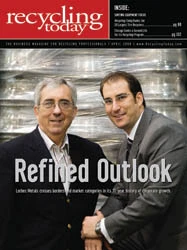Studying the history of exchange markets can prove to be quite a jolt for younger traders. During the 21st Century, the "computer revolution" that began the previous century has pushed beyond the desktop with the increased convergence of the computer with the cellular telephone.
With the popularity of BlackBerries, iPhones and other devices, current information for interest rates, stocks or metals prices can travel with people every waking moment of their days.
Much less familiar to young traders is a world where pricing was both established non-electronically and traveled as news at a much slower pace.
Ferrous scrap traders have long worked on a monthly pricing basis, to some extent reducing the urgency to gauge pricing influences daily. Although Michael Friedman, president of Scrap & Waste LLC, Louisville, Ky., has traded primarily in nonferrous metals throughout his career, he recalls in his initial years as a trader that for ferrous pricing, "Everything was based on the Iron Age prices and monthly figures that had you set for the next 30 days. Very rarely, they had mid-month adjustments."
A 30-day price was accepted by scrap iron traders and steel mills despite the risk of a large swing at the end of the 30-day span, perhaps in part so that constantly monitoring and shifting prices would not have to become part of the routine.
Nonferrous scrap traders, on the other hand, have not had the luxury of occasionally checking market trends. Friedman recalls in his early years at Colonial Metals, Columbia, Pa., a teletype machine provided updated COMEX pricing four times each hour during the trading day.
"Every 15 minutes, we’d race to the ticker tape machine to see the COMEX changes coming over from Reuters," recalls Friedman. The updates were passed around, and eyes were kept open for volatility.
For scrap recyclers in that era, obtaining LME pricing might be even more low-tech, involving placing a phone call to a trusted primary metals trader who was able to afford the pricing feed from that overseas exchange.
NOWResearchers who wish to demonstrate that information now travels both faster and far differently than it did just a few years ago can find an intriguing case study in the scrap metals pricing sector.
Traders whose careers span no more than three decades have seen a parade of changes in how they keep up with the pricing of copper, aluminum and other metals.
Depending on just how up-to-the-moment traders wish to be, there are a variety of ways to receive metals pricing information.
Simply performing a search on the word "copper" on a news Web site can yield semi-regular updates posted by news services such as Reuters, AP and Bloomberg. Bloomberg specializes in providing comprehensive financial news and market coverage, but purchasing its overall service is generally reserved for large-scale securities and bond traders.
Bloomberg offers some periodically updated LME futures pricing (for aluminum, copper, lead, nickel and zinc) on its Web site at www.bloomberg.com/markets/commodities/cfutures.html.
Many scrap traders have found a highly regarded pricing update service at MetalPrices.com. The service was created by David Behr, whose last name is familiar to scrap recyclers who have ever traded with Behr Iron & Metals, based in Rockford, Ill.
The Web site bills itself as a licensed vendor for the LME, COMEX, NYMEX, Dow Jones and Reuters, as well as the SHFE (Shanghai Futures Exchange).
"Live feed" services remain on-screen throughout the day for nonferrous traders like Michael Dorfman of State Metal Industries, Camden, N.J. "We have a live feed and we watch it all day long," Dorfman says.
In a global industry, access to SHFE numbers has proven a popular feature of MetalPrices.com, as has the wide range of metals it covers. "I deal with molybdenum and cobalt, and those minor metals are included," says Michael Friedman of Scrap & Waste LLC, Louisville, Ky. "And for global trading, it’s great because pricing is available in euros, pounds and other currencies."

Explore the April 2008 Issue
Check out more from this issue and find your next story to read.
Latest from Recycling Today
- BMW Group, Encory launch 'direct recycling’ of batteries
- Loom Carbon, RTI International partner to scale textile recycling technology
- Goodwill Industries of West Michigan, American Glass Mosaics partner to divert glass from landfill
- CARI forms federal advocacy partnership
- Monthly packaging papers shipments down in November
- STEEL Act aims to enhance trade enforcement to prevent dumping of steel in the US
- San Francisco schools introduce compostable lunch trays
- Aduro graduates from Shell GameChanger program





